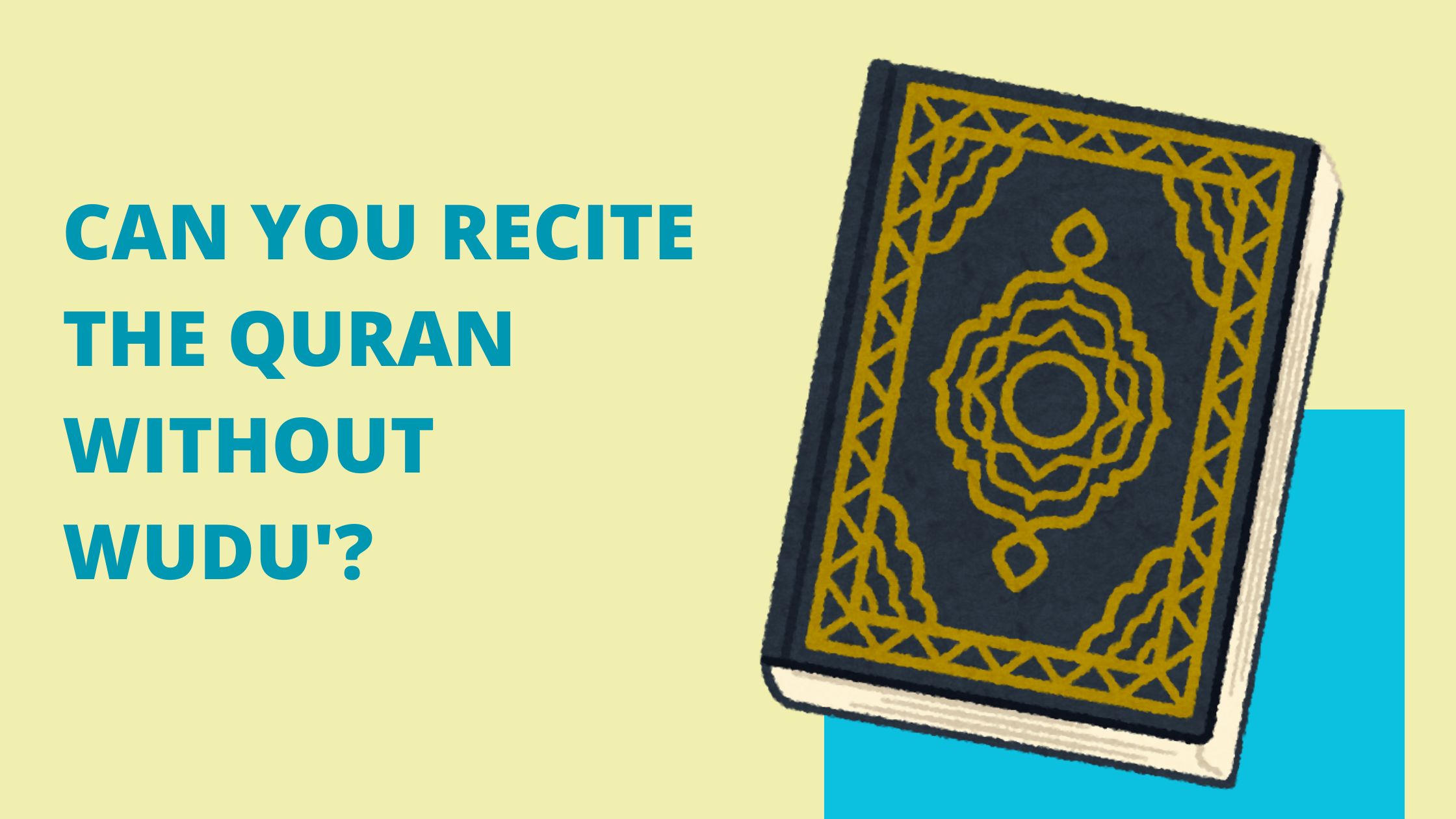Can You Recite The Quran Without Wudu’? Wudu’ is the sacred key to Quranic recitation, ensuring both physical and spiritual purity. While digital access offers convenience, the Mus-haf demands ritual cleanliness. Yet, the Quran’s teachings remain accessible, inviting reflection and action, echoing Allah’s mercy in every verse.
As a Muslim, reciting Qur’an is definitely a part and parcel of your day. It is such an irreplaceable, consistent act of worship that you keep performing, whether separately, or in other acts of worship, like in salat (praying), and dua’ (supplicating).
Table of Contents
How Important Is Wudu’?!
Wudu’ is essential, and pre-conditional in many acts of worship in Islam, like in salat- that main bond with The Creator, and in which, we recite Qur’an: Allah’s Messenger (ﷺ) said: “There is no (valid) salat of a person, without wudu’, and there is no (valid) wudu’, without mentioning Allah’s Name (before it).” (Sahih).
Undoubtedly, wudu’ doesn’t only purify the body, but it also refreshes the mind, and prepares the heart to be fully present, when performing all the acts of worship, of course, not to mention, when reciting Qur’an, The Book of Allah!
There are so many question that you may have, regarding reciting Qur’an, with-or-without wudu’; so, here we are to answer you the most crucial of them:
Can You Recite Qur’an from Mus-haf Without Wudu’?
When it comes to reciting the High, Holy Book- Qur’an, from the Mus-haf, as a Muslim, sure, you need to perform wudu’ first; in Qur’an, itself, Allah tells us about its purity, which necessitates also the purity of those holding it: [None touch it except the purified (i.e., the angels)]-[Al-Waqi’ah: 79].
So, according to the Four Imams, and the majority of the Islam-scholars, it is not permissible to touch the Mus-haf to recite Qur’an, while you are not purified yet, (from all impurities, whether from the major, or the minor). Confirming this fatwa is also that hadith of the Prophet (ﷺ), in a letter to Amr Ibn Hazm for instructing him who is permitted to hold Mus-haf; He (ﷺ) said: “Only the purified touch it (Qur’an).”
Then, if you are purified from the major impurities, but yet without wudu’, you can still recite Qur’an, but without touching Mus-haf, by your hands- ‘only reciting, with no touching!’
Otherwise, you can hold it to recite, only with something in between (like a wrapper, or gloves). Also, you can recite Qur’an from other than Mus-haf, like the Qur’an-interpretation books, were the ayahs are already included.
So, whenever you want to actually hold Mus-haf to recite Qur’an, make sure that you are already purified (tahir) from the major impurities, and from the minor, too, by performing your wudu’ first!
Can You Recite Qur’an, from Memory Without Wudu’?
Without wudu’, it is okay to recite those ayahs, or surahs that you already memorized, without Mus-haf. Only the junub (ritually impure, due to sexual intercourse, or seminal discharge) cannot recite the Qur’an, neither from Mushaf, nor from memory.
He needs to take a bath (ghusul) first to be purified, so that he can recite Qur’an, only then. It is narrated that the Prophet (ﷺ) used to perform wudu’, recite some ayahs, and said: “This (reciting Qur’an) is for the one who is not junub; as for the junub, no! Not even one ayah.” (Hasan).
Can You Recite Qur’an on Phone Without Wudu’?
Yes, you can, as long as it is not that hard copy of Mus-haf, which necessitates wud’u to touch it, as previously mentioned. So, whenever you are on your phone, and even without wudu’, you can still recite Qur’an! Don’t miss this chance!
Can You Learn, or Memorize the Qur’an, Without Wudu’?
Again, as long as you don’t touch Mus-haf without wudu’, you can still recite, memorize, or learn Qur’an, whether on phone, tablet, or in an interpretation-book of Qur’an, for example. Masha ‘Allah, nowadays, we have multiple ways to learn Qur’an! And it is such a mercy and blessing from Allah which we should cherish, and make use of; Allah Almighty says: [And We have certainly made the Qur’ān easy for remembrance, so is there any who will remember?] [Al-Qamar: 32].
What Rules to Follow, When Reciting the Qur’an?
There are certain manners, and rules to follow, while reciting the Holy Book of Allah Almighty; let’s mention some, here:
1. Setting the Right Intention and Reverence
Set your intention to feel, and show the due awe, and reverence to Allah Almighty, through your proper practices with His Holy Book, whether reciting, memorizing, reflecting, or acting upon His messages to us, mentioned in Qur’an.
2. Beginning with “Bismillah” and Performing Wudu’
Say “Bismillah” (mention the Name of Allah), and perform your wudu’ first, to get properly ready for the company of the Holy Qur’an.
3. Choosing a Quiet Time and Space
Choose wisely a certain, quiet time to clear your mind, and open your heart to the guiding lights of Qur’an.
4. Creating a Tranquil Environment for Recitation
Select a clean, tranquil place, or spot, so that you can shush the noise in your head, and be all ears, and fully attentive to your recitation of Allah’s Words to you.
5. Reciting Qur’an with Correctness and Tajweed
Recite Qur’an correctly, word by word, and apply the tajweed-rules. You can learn with Native Arab tutors who are certified from al-Azhar with Bayan al-Qruan.
6. Reciting Slowly and with Awe
Try to recite Qur’an slowly, and with awe-tone; let it go deep inside you, evoke your genuine feelings, and enlighten your thoughts!
7. Remaining Mindful of Allah’s Messages
Keep mindful of Allah’s messages to you, through the ayahs you are reciting. So concentrate on the verses you read and reflect on them by your heart.
8. Reacting Appropriately to Ayahs
React with the ayahs; praise Allah, when the ayahs are about those praising Him, and ask for His refuge, when they are about the Satan, etc.
9. Seeking Clarification for Understanding
If you are not sure about comprehending a certain ayah, look for a clarifying Qur’an-interpretation book to help you understand it well.
10. Acting Upon the Verses of Qur’an
Act on what you are reciting; Allah Almighty didn’t bless us with Qur’an, just to recite it, with no actions!
Rather, Allah guides us by Qur’an, telling us what to do, and how to act. Following Qur’an leads us to all guidance and mercy; Allah Almighty says: [And this (Qur’ān) is a Book We have revealed blessed, so follow it, and fear Allāh that you may receive mercy.] [Al-An’am: 155].
Learn the Quran Online With Bayan al-Quran Native Arab Tutors:
Embark on a transformative journey of Quranic learning with Bayan Al-Quran’s comprehensive online courses. Our platform offers an authentic and immersive experience tailored to learners worldwide. Whether you’re a beginner or seeking to enhance your skills, our Tajweed courses provide expert guidance and structured learning to master the art of Quranic recitation.
🎓 Expert Guidance:
Benefit from experienced instructors who specialize in Tajweed, breaking down complex rules into manageable segments for learners of all levels.
✨ Key Features:
- Structured, step-by-step learning approach.
- Access to high-quality instructional materials.
- Real-time feedback from qualified tutors to enhance your practice.
- Flexible learning schedules to accommodate your pace and convenience.
- Immerse yourself in the melodious tones of Quranic recitation, enriching your spiritual experience.
🌟 Why Choose Bayan Al-Quran?
Join our vibrant community dedicated to perfecting Quranic recitation. Build a profound connection with the divine words of the Quran and enrich your spiritual journey. Choose Bayan Al-Quran for a transformative learning experience and embark on a path to mastering Tajweed with confidence.
You can also attend online Quran Classes with Bayan al-Quran with Native Arab tutors. There are also several courses that can help you in this regard:
- Online Quran Classes For Kids
- Learn Arabic Online For Kids
- Islamic Studies Online Course
- Noorani Qaida Online Course For Kids And Adults
- Arabic Tutors Online
Conclusion:
Reciting the Quran without wudu’ is permissible for memorized portions or from digital sources. However, physical contact with the Mus-haf requires wudu’ for purity, as stated in Quranic verses and hadiths.
Touching the Mus-haf without wudu’ is prohibited, but reciting from memory without wudu’ is allowed, except for those in a state of janabah, who require purification through ghusul.
Learning and memorizing the Quran can be done without wudu’, using digital devices or interpretation books, as long as one avoids direct contact with the Mus-haf without purification. The importance of wudu’ lies in its spiritual preparation, cleansing the body, refreshing the mind, and enabling full presence and reverence during acts of worship, including recitation of the Quran.














